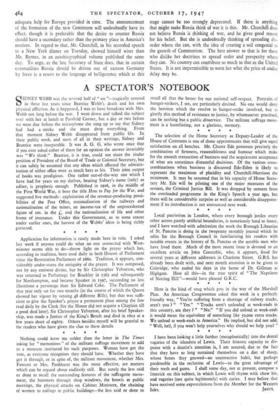A SPECTATOR'S NOTEBOOK
SIDNEY WEBB was the severed half of "we "—tragically severed in these last years since 135atrice Webb's death and his own physical affliction. As it happened, I was to have broadcast with Mrs. Webb not long before the war. I went down and talked the subject over with her at lunch at Passfield Corner, but a day or two before we were due before the microphone she rang up to say that Sidney had had a stroke and she must drop everything. From that moment Sidney Webb disappeared from public life. In their public work, and most of all in their writings, Sidney and Beatrice were inseparable. It was A. G. G. who wrote once that if you ever asked either of them for an opinion the answer invariably was "We think." Beatrice, it is true, could not share the titular position of President of the Board of Trade or Colonial Secretary, but it can safely be assumed that any ideas which affected the adminis- tration of either office were as much hers as his. Their joint output of books was prodigious. One rather out-of-the-way one which I have had for years on my shelves, bearing Sidney's name (only) as editor, is prophetic enough. Published in 1916, in the middle of the First World War, it bore the title How to Pay for the War, and suggested five methods : exploitation of the revenue-producing possi- bilities of the Post Office, nationalisation of the railways and nationalisation of the mines, an income-tax of the unprecedented figure of los. in the k, and the nationalisation of life and other forms of insurance. Under this Government, as to some extent under earlier ones, the harvest of the Webbs' ideas is being richly garnered.


































 Previous page
Previous page